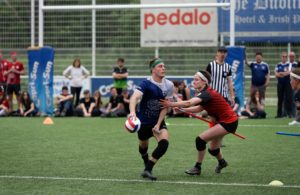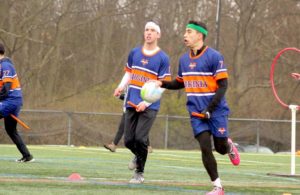- Rule, Britannia, no more?
- Unpopular Opinions: US Quadball Cup 2023
- Proven Contenders: University of Virginia
- Proven Contenders: Rutgers University
- Proven Contenders: University of Michigan
- Proven Contenders: Creighton University
- Different Perspectives: A Look Inside USA Ultimate
- Antwerp QC, Much of Belgian Core, Leaves Competitive Quidditch
West Regional Roundup
- By Ethan Sturm
- Updated: March 6, 2017
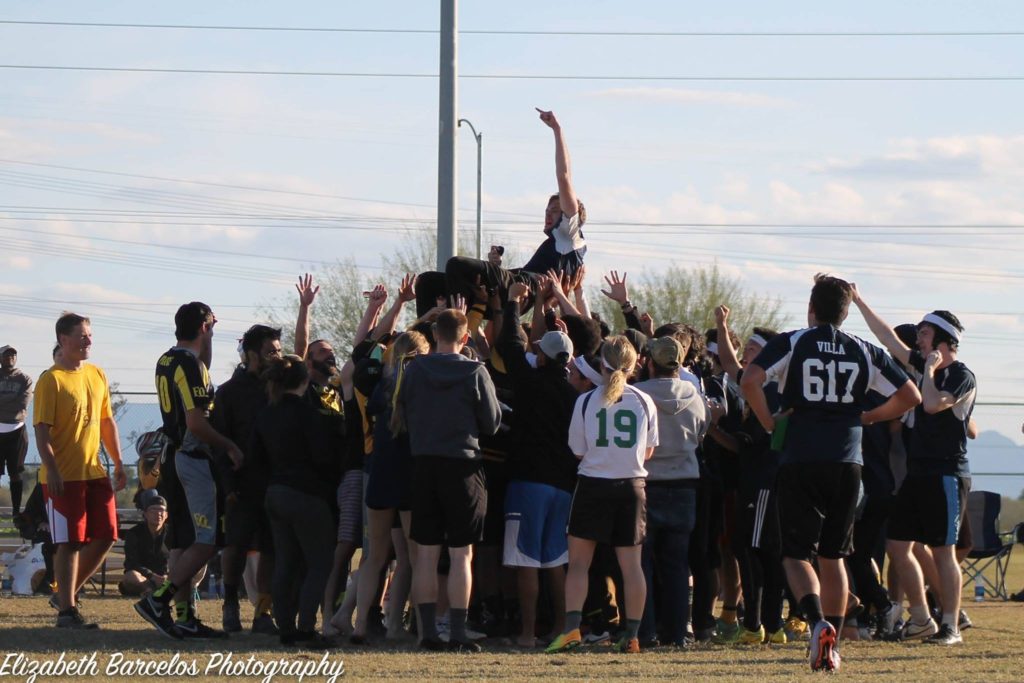
Credit: Elizabeth Barcelos Photography
Resume Builders
Shortly after Arizona State University’s stunning 280*-230 victory in the finals of the West Regional Championship, a debate sprung up in The Eighth Man’s rankings group: What do we do with as unprecedented of a case as the Sun Devils? On one hand, the team is undefeated—though, to be fair, one of likely four teams to enter nationals that way due to the constant devaluing of the regular season—and fresh off a regional title in one of the sport’s three most storied regions. But on the other hand, there are plenty of gaping holes in the Arizona State resume.
Assuming the Sun Devils are done with official games until US Quidditch Cup, they will enter that tournament with a perfect 19-0 record. However, only five of those 19 games have come against teams that qualified for nationals, and just two of them have come against teams ranked in our Top 20 at any point this season. While an undefeated record is never something to ignore, Arizona State did it with about as easy of a schedule as you could imagine in a region that is very clearly having a down year across the board.
Despite the ease of the Sun Devils’ slate, the victories have not come cheaply. Arizona State is a perfect 8-0 in SWIM situations, with two wins over Northern Arizona University, two wins over the Long Beach Funky Quaffles and one win each over the Arizona Jackalopes, the Los Angeles Gambits, the Lost Boys and Crimson Elite. That means that not only have the Sun Devils played three in-range games against non-qualifying opposition, but they have not put a single nationals-qualified team out of range this entire season.
This is all well and good when you have an impenetrable snitch-on-pitch game, but history shows us those rarely exist, as excited as we tend to get over teams with impressive marks throughout an entire USQ season. Think of last year’s Ball State University, who made a US Quidditch Cup semifinals run on a series of snitch-range grabs that helped earn Jason Bowling a place on Team USA. Even that Cardinals team went just 9-4 in SWIM in the regular season and 4-2 at nationals, losing to Rutgers University in pool play. Similar things can be said about last season’s Illinois State University team, who entered nationals 13-4 in SWIM situations but failed to catch the snitch in a game against Northern Arizona University that would have sent them to bracket play. Going even further, we can look at Team USA, who had Michael Duquette and Max Havlin beating for some of the best seekers in the world and still failed to win their only in-range game. Some teams are undoubtedly better than others at snitch-on-pitch, but that translates at best to a 60-40 advantage over time, not a 100-0 advantage.
The bigger question here is why Arizona State finds themselves in so many SWIM situations, and the answer to that is a complete lack of quaffle offense during the seeker floor. Do not let the high scores due to long periods of snitch play against the Lost Boys and Gambits fool you. The Sun Devils scored just 20 points in the first 18 minutes of game time against the Lost Boys in the semifinals, and just 50 in the first 18 minutes of game time against Long Beach in the quarterfinals. While you could argue that staying in a long-scoring affair with the Lost Boys is strategic, Long Beach is the kind of team a top pot one team needs to be putting out of range—the Gambits beat them by 130 points on Saturday—if the Sun Devils want to stay unblemished day one and provide themselves a real shot at a deep bracket run at nationals.
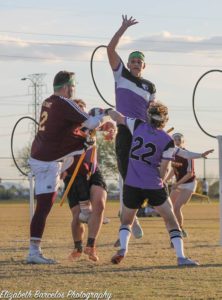
Credit: Elizabeth Barcelos Photography
None of this is to say that Arizona State is a bad team or undeserving of what they have earned so far. But as we enter March, I can’t help but compare them to a college basketball team from a mid-major conference, entering the NCAA Tournament with a particularly barren resume. Sure, wins are wins, but when most of them are against weak opposition, with a couple impressive ones sprinkled in, it’s hard to truly know what they will do when the going actually gets tough. Add some statistical anomalies and a series of narrow victories, and you wonder how much of Wichita State’s resume is built on air.
As someone who cannot help but root for college team success, I want nothing more than for the Sun Devils to find success in Kissimmee. But for a program that has been to five West finals and won three, their resume is notably lacking in national success. And it might be just a bit too early to buy into that changing this season.
A Tale of Two Teams
This past NFL season, I was in a fantasy football league with a group of quidditch players, and each of us put a quidditch spin on our team. After drafting my team, I named them “Gambits Before SOP” because I thought my team was amongst the elites. But anytime I would lose a week, I would switch my team name to “Gambits With SOP” — a team that, despite being made of the same players as the one that plays the first 18 minutes of quidditch matches, cannot seem to do anything quite right when the snitch is on pitch.
That reputation began almost two years ago at World Cup 8, when the Gambits had Lone Star Quidditch Club on the ropes. Lone Star, who entered the tournament ranked No. 1 nationally, had already lost to Texas State University and was facing potential elimination before bracket play, was down 70 points to the Gambits, who had executed a flawless strategy in the opening 18 minutes. Yet, somehow, Los Angeles left the door open with snitch on pitch, letting Lone Star work its way all the way back into snitch range and catching to complete the comeback.
History repeated itself a year later when the Gambits took on Sam Houston State University in bracket play at US Quidditch Cup 9. Up by a large margin once again, Sam Houston rallied all the way back into range, caught to force overtime and were on the verge of a victory before Tony Rodriguez’s last-second snitch grab. However, the match still took its toll, and a tired Gambits side bowed out of the tournament shortly after with a loss to Rochester United.
Then, a few months later in the MLQ Championship, the Los Angeles Guardians, a roster made up in part of a large group of players from the Gambits, found themselves 80 points ahead of the underdog League City Legends 25 minutes into gameplay. But they once again capitulated a lead, were outscored by 100 quaffle points the rest of the way, and lost on a snitch grab.
This all serves as a lead up to perhaps the bitterest loss yet, as the Gambits led the West Regional Championship by as much as 40 points with snitch on pitch. While the lead may have not been as large and they were not the favorites to win nationals or MLQ, here they were the heavy favorites to become the first-ever, three-time West Regional Champions. Instead, they were beaten down the rest of the way, trailed by as much as 30 and had far fewer chances at the snitch before Arizona State finally had a catch called good.
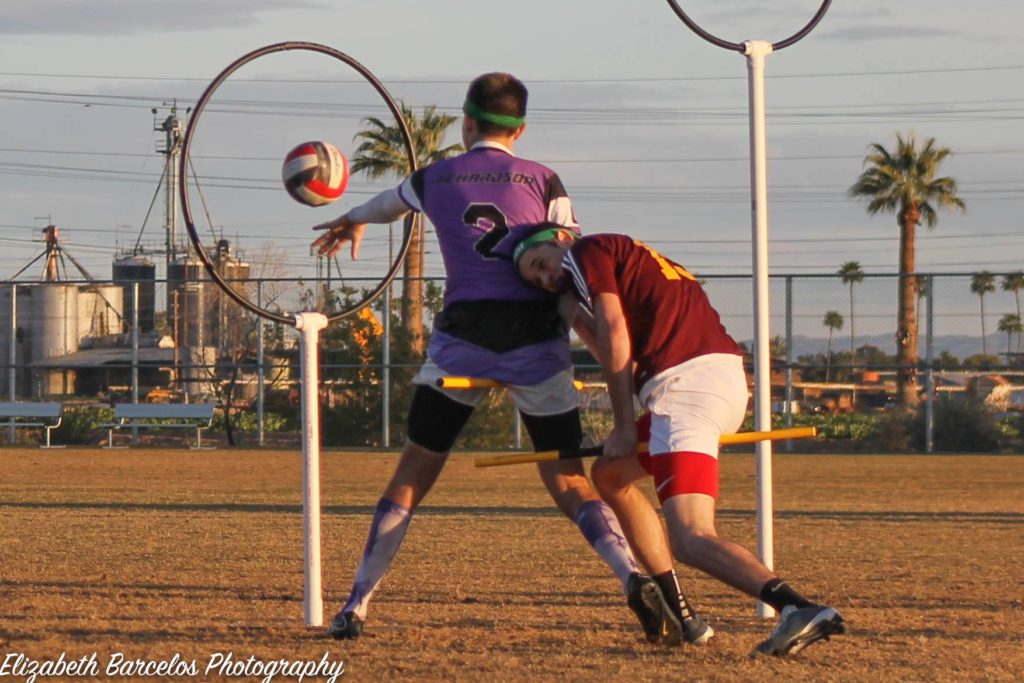
Credit: Elizabeth Barcelos Photography
The Gambits are an incredibly talented quidditch team. They have consistently been a top 10 team since their formation years ago and have two former Team USA selections. They can do incredible things like get 70 points ahead of a Lone Star team in its prime on its way to a US Quidditch Cup final. So why can’t they figure out snitch on pitch?
The first issue, at least in the their most recent loss, is basic strategy. The Gambits were up 40 points on two different defensive possessions with snitch on pitch. At times like that, the only choice is to bring your beaters back into the quaffle game. Doing so puts the opposition in an impossible position: either leave their bludgers in the snitch game and get eviscerated in the quaffle game, or also bring their bludgers into the quaffle game and give your seeker infinite free shots at the snitch. You can even slow ball once you have the quaffle to allow your beaters free beats on the defensive seeker. It is this dichotomy that should make an out-of-range lead, even a small one, all but unassailable.
In this game, none of those things ever happened. In the first of the two defensive possessions when they were up 40 points, the Gambits simply never had a bludger, which is more or less out of their control. Arizona State quickly drove down the field and scored. However, the second of the defensive possessions began with Steve DiCarlo at beater standing at midfield with all three bludgers by his feet. DiCarlo insured his team bludger control, but did so with by rolling the bludger out to the side near the snitch instead of throwing straight back to his hoops. He then immediately took off for a beat of the defensive seeker, leaving no bludgers in the quaffle game and an easy goal for the Sun Devils.
This in no way is meant to blame DiCarlo, who as a beater with snitch on pitch has a thousand things playing through his head. But someone, if not everyone, needs to be stepping up on the sideline and making sure he knows the situation at hand. That singular defensive stop could have been the game decider, but instead, it was a chance missed.
I’d even go as far as to argue the Gambits could have been more aggressive with their bludgers while up 30 points. Sure, it’s technically in snitch range, but being forced into overtime is far different than losing, a concept not appreciated enough in such situations. Given the Gambits dominance during the seeker floor and snitch Willis Miles’ dominance throughout the game, you would have to imagine Los Angeles would be favored in an overtime scenario. So, while up 30 points with the quaffle, if they pulled their beaters into the quaffle game, they’d risk ending up in a situation they are slightly favored in for a chance at a situation they are heavily favored in. Instead, they protected themselves from the slightly favored situation potential of overtime and instead fell into a far more difficult situation of trailing by up to 30 points in the quaffle game.
Still, even with these small strategic flubs, the Gambits should not be losing as much ground in the quaffle game with snitch on pitch as they consistently have in these situations. The issue in these moments has generally been an overreliance on Rodriguez. Rodriguez is undoubtedly the star of the team and easily one of the five best quaffle players in the sport. But a single player, no matter how talented, can only go so far in a long snitch-on-pitch game, especially when he is also part of the team’s seeker rotation.
Rodriguez played basically the entire game during the seeker floor, then only took one 3-minute break with snitch on pitch before a late game break as he switched over to seeker. That means he logged nearly 40 minutes game time at keeper—during which he often steps up and plays point—as Arizona State did everything it could to pound him with their most physical players.
The weariness showed as the game progressed, but even at that, he was far more productive in snitch-on-pitch bludgerless situations than the rest of his team. On possessions in which he did not pass with snitch on pitch, he scored on five of six attempts. When he did throw a pass, the team only scored on three of five attempts, with one of the three coming after a loose ball scrum that the Gambits were lucky to maintain possession through. If Rodriguez isn’t the one putting the ball through the hoop, Los Angeles simply isn’t scoring at the rate necessary to contend in snitch-on-pitch scenarios.
The final nail in the coffin for the Gambits is the inefficacy of their seeker beating. Arizona State had three snitch grabs called off before finally having one called good, but in that time the Gambits came up with just one truly good shot, despite the strength of their seekers. This is in no small part due to Ryan McGonagle and Vicky Sanford dominating the seeker beating from start to finish.
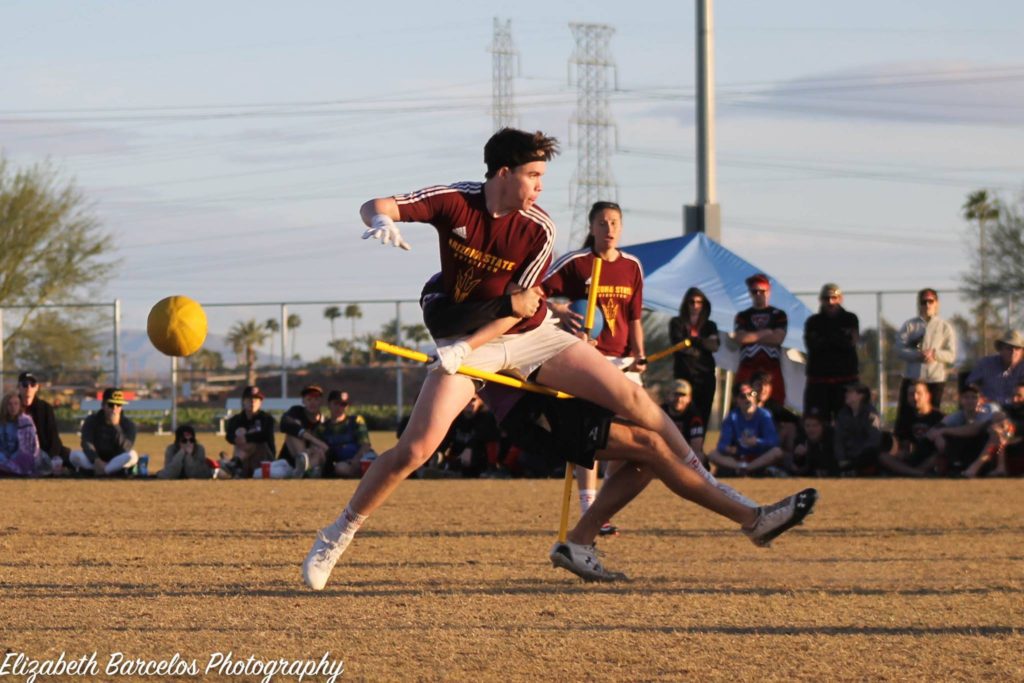
Credit: Elizabeth Barcelos Photography
While McGonagle and Sanford are both dynamic beaters, the issue boils down to lack of key traits for the Los Angeles beaters. None of the Gambits’ beaters are known for their arm strength, which is a key factor in good seeker beating. One moment that sticks out is a beat attempt on Sanford that bounced off her with so little force despite being thrown from mere feet away that the ball stayed within her catch radius. This also affects just how quickly you can get a key beat in on the seeker, adding precious extra seconds to the Sun Devils time with the snitch. The first called-off grab, for example, was made about half of a second before a Gambit beat.
Though the issues with snitch-on-pitch are clear for the Gambits, there are worse problems to have. If the team tightens up its communication and strategy in such scenarios, they can lean on a dominant and well-conceived first 18-minute strategy to make a deep run at US Quidditch Cup 10. But if they cannot, we could all be having some deja vu next month.
The Evolution of the Ant
While much of the drama of the West Regional Championship was sucked up by an incredible finals match, a development arguably just as important occurred in the match prior. In the tertiary bracket final, with the last qualifying spot on the line, University of California-Irvine, more commonly know as Anteater Quidditch, defeated Northern Arizona University, 120*-80, and became the only college program in the country to qualify for nationals for the first time this season.
Let that sink in for a moment. With 60 bids given out nationwide, we were one snitch grab away from inviting no college programs that had never been to nationals to our sport’s biggest tournament. Instead, we were all lucky enough to get Anteater Quidditch, a perfect case study in the way our sport can, and needs to, move forward.
Anteater Quidditch was formed at University of California-Irvine in the fall of 2013 by Jamie Luby, who had come from the UCLA program, and a group of new players interested in trying the sport. After more than a year of being overmatched on the local level, they traveled to the West Regional Championship in February of 2015 and finished in last place in the final rankings.
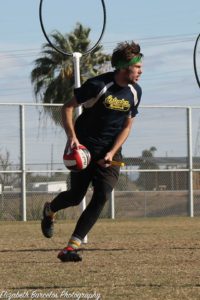
Credit: Elizabeth Barcelos Photography
Undeterred, the team built from within. They fundraised to make continued tournament travel feasible. They were given the opportunity to play in tournaments that didn’t exclusively feature the best of the best. They retained and developed key players with help at times from the various community teams in the area, including the Los Angeles Gambits.
This year’s West Regional Championship, the Anteaters’ third regional appearance, was a perfect microcosm of the program’s brief history. Saturday was a bit of a beatdown, with three out-of-range losses and a single win over Stanford University that qualified the team for Sunday. On Sunday morning, they proved to be every bit the equal of the program that had in part originally given them life, defeating UCLA in the first round of bracket play, 80*-70. After playing their hearts out in the quarterfinals, they came just a snitch grab short of qualifying on the spot, losing to the Crimson Elite, 60*-10. They followed it up with a beatdown at the hands of UCLA with a second shot at qualifying, and put them in the scenario of needing to win back-to-back games in the tertiary bracket. But the upstart squad did just that, defeating the Silicon Valley Vipers in overtime, 110-100*, and then catching the snitch to beat Northern Arizona University, 120*-80, and send the program to its first ever nationals.
A fresh-faced college team with the support of players from a well-defined community team and the realistic opportunity to grow in competition instead of being consistently beat down: this is the model that got Anteater Quidditch the final West bid. This is the model that our sport needs going forward to survive, and this is why the college-community split is so important. It is time for us to all swallow our selfishness and help the Anteaters of the world thrive. Otherwise, there will not be any quidditch to play for much longer.
Related Posts
About Ethan Sturm
Ethan is the co-founder and former managerial editor and chief correspondent of The Eighth Man. When not talking quidditch, which is rare, he can be found drilling people's teeth and spending time with his elusive wife. He's also the worst.

